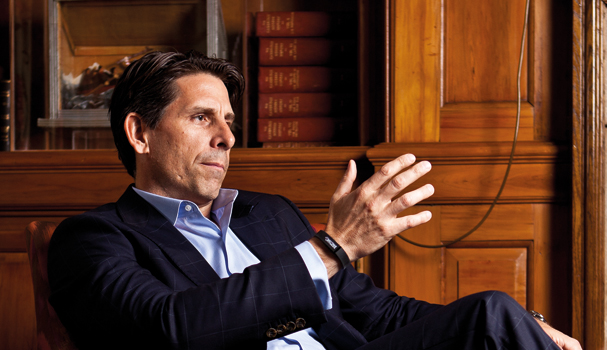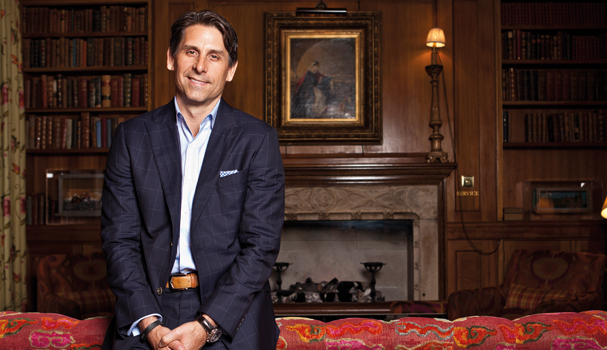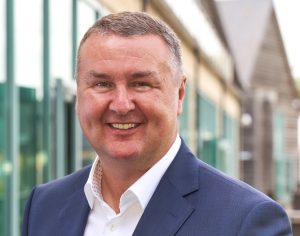It’s quite some statement to get a tattoo. To have the name of a loved one, an adored pop star or a cherished football team permanently emblazoned on one’s skin would, for many, be a step too far. But not, it seems, for Anytime Fitness members and franchisees. Nearly 2,000 people around the world now have the gym franchise’s purple running man logo permanently inked on various body parts.”
For many of its members and franchise owners, Anytime Fitness isn’t just a health club franchise. The company has changed their lives, helped them get fit or lose weight, explains Chuck Runyon, Anytime Fitness co-founder and CEO. “The reasons they do it are so deep and profound. Businesses can’t be so transaction-based. For us, it’s all about engagement; engaging with employees and engaging with members.”
Somewhat inevitably, the Minnesota-born entrepreneur also has a running man tattoo – on the back of his arm. “You have to lead by example,” smiles Runyon.
Of course, 2,000 people is a drop in the ocean in the context of a gym company that now spans 20 countries, has 2,500 outlets and more than two million members. But with the bright, charming and utterly convincing Runyon at the helm, it’s not difficult to imagine more Anytime Fitness disciples following suit (it helps that they get reimbursed for the cost of the tattoo).”
From a young age, Runyon knew that he wanted to work in health and wellbeing. “I was an average student at best,” he says. Instead of poring over textbooks, his time was consumed with playing sports and, as he got a little older, paper rounds and part-time jobs in various fast-food restaurants.”
There was another dominant theme in his childhood: his older brother was regularly hospitalised with a serious medical condition, which eventually claimed his life at 18. Runyon was just 13 when he lost his older sibling. “We grew up lower middle class and often struggled because medical insurance wouldn’t necessarily cover all of the hospital visits and treatment,” he recalls.”
“It was, of course, a painful experience for me, my parents and my family. It’s always given me a dose of perspective that life is a bit uncertain. I guess I have a bit more of an appetite for risk or adventure than most people; maybe I’m a lot less fearful because I realise that life is uncertain.”
Watching his parents struggle for cash throughout his childhood also drove Runyon to want to be successful. “I think birth order – I was a middle child – being competitive and seeing your friends have things that you don’t all drives you to want success and the material things that come with that,” he says.
Having abandoned early dreams of becoming a basketball player, Runyon began working in local gyms and health clubs after completing his high school education. And at 21, he decided it was time to leave Minneapolis and go overseas to find fame and fortune. For six years he travelled around the US, Canada and Australia with pal Dave Mortensen – his Anytime Fitness co-founder – to work as a business development consultant for gyms and health clubs.”

“We would go to a local town and work there for about two months and we would do a barter: we would give the local hotel free memberships to the club we were working with in return for staying there for free. And in the two months we were there we’d work to drive membership for the local health club and train some of its staff,” Runyon explains.”
They were then given a percentage of revenues, based on performance. It was an incredible opportunity, he says. “Just when we were starting to get a bit bored we’d move on to to another somewhere else. It gave me the chance to see small, medium and large towns all across the US. I was a kid from the east side of St Paul, Minneapolis, which is slightly lower income, so for me to travel and go to the south or go to the east or go to Canada was very eye-opening. I had never been on a plane before I was in my twenties, just because we couldn’t afford it. I was going to states that my parents had never been to. It was a really wonderful experience.”
In time, the pair franchised the model. As they travelled, they would train other people to do the same. “We would have 15-20 teams all across the US doing this and we’d get paid a percentage,” he says. Then, in 1995, they came across a distressed gym in west St Paul, close to the Twin City area of Minneapolis. “
“We bought it from the bank very, very cheaply,” Runyon says. “We put equipment in it, we remodelled it entirely. So, while I travelled the country, my partner primarily did that.” From 1995 until 2002, that club was so successful that Runyon and Mortensen bought another two similar spaces. “At one point, we owned three full-service clubs in the US. They were typical 4,000 sq metre clubs with all these different features,” he explains.”
But there was a glitch. “Although it was profitable, we noticed that most of our members were not using all the areas: they weren’t using the racketball courts or the smoothie bar. 90% of our customers came and used cardio machines and weights. In addition, we had all these overheads: utilities, pool chemicals, staffing and we were thinking, ‘We’re paying for all of this but people are only using a small portion of it.'”
The genesis of the idea for Anytime Fitness was formed: conveniently located gyms, with cardio machines and weights but without the bells and whistles of full-service centres. They would be accessible 24/7 and, as a result, occasionally unstaffed. “That business model did not exist at the time, and most people did not think it would work – including family,” elaborates Runyon.”
The smaller gyms attracted a different type of clientele, he adds. “It’s a smaller environment, in which people feel more comfortable. In our industry, there’s a lot of intimidation, a lot of fear about not belonging because people think they’re not in good enough shape, so the smaller environment really reduces that barrier,” he says.”
The decision to franchise the business was a no-brainer, says Runyon. “We decided from day one that we would franchise,” he says. “My only franchising experience was working at McDonald’s when I was younger. We knew nothing about franchising, but we thought it was a very interesting way to grow because when you franchise you use other people’s capital or landlords’ capital to grow faster.”
The allure was heightened because another fitness franchise was going gangbusters. “At the time, Curves was very, very big in the States. When we started Anytime Fitness, they were very much still in their prime. At one point they had over 10,000 global units,” explains Runyon.”

Hannah Prevett
Prevett likes to think she's something of an expert when it comes to small business. Having cut her teeth writing about tech, she latterly moved on to such illustrious titles as Growing Business, Management Today and the Sunday Times to indulge her enthusiasm for entrepreneurship: from P&Ls to private equity and all that's in between, you can't keep this girl away from the heady world of start-ups.
Back in the day when she had spare time, she would spend it networking, horse riding, drafting and re-drafting ideas for novels, and playing auntie to her niece and three god-children. Those were the days...

Hannah Prevett
Prevett likes to think she's something of an expert when it comes to small business. Having cut her teeth writing about tech, she latterly moved on to such illustrious titles as Growing Business, Management Today and the Sunday Times to indulge her enthusiasm for entrepreneurship: from P&Ls to private equity and all that's in between, you can't keep this girl away from the heady world of start-ups.
Back in the day when she had spare time, she would spend it networking, horse riding, drafting and re-drafting ideas for novels, and playing auntie to her niece and three god-children. Those were the days...
































